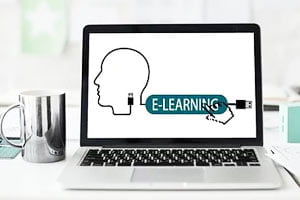With so many of us making to move to remote learning in recent times, educators have been searching for the best methods and software for making the move to learning remotely. Meanwhile learners are looking for ways to fill spare time as well as options for up-skilling and finding online resources for furthering their career or changing career direction. There are many options available and some of these are looked at in more detail below..
Original Publish Date: April 2020
Remote Learning Resources for Educators
With so many educators from primary, secondary, third level and private education sectors now offering online lessons, there will not be one solution that suits all. Some will suit a relaxed approach using live video calling apps such as Skype, Whatsapp and Instagram, whilst others will require a more in depth and controlled process using software such as Edmodo or Google Classroom. There will be many cases of using a combination of technologies, for example many educators are using Edmodo and Youtube Live together to offer both live classes and other functionality such as assignments and testing. For providers that offer online education on an ongoing basis they will often have bespoke custom built solutions which will be tailored to specific needs.
Live Classes and Facetime Apps.
The most popular of these are listed below, there will also be other less well known options..
- Skype
- Instagram Live
- Youtube Live
- Zoom
Class Management Software & Learning Management Systems (LMS’s)
Edmodo is a popular LMS which offers class management options such as assignments, quizzes and other features. It can be integrated with Youtube Live for live classes.
Google Classroom – One of the leading options just because almost everyone has a Google account these days so in terms of setting it up this makes it a bit easier, falls down in terms of ease often requiring multiple other Google apps such as Google Docs, Google Drive and Google Hangouts for live classes.
Moodle – Unlike the options above this can be installed on a website and may therefore be more suited for a long term solution. Moodle is based on a modular design that lets teachers and administrators build their own curriculum using plug-ins for various workflows, content and activities. There is also a cloud based Moodle option that does not require installation but this is limited to 50 users.
Some other resources to help educators find suitable options are listed below..
Futurelearn are running a free online course – How To Teach Online: Providing Continuity for Students – The course explores online teaching for educators designed in response to the COVID-19 pandemic. the course has had over 20,000 enrolments who have collectively posted over 15,000 comments so will provide lots of feedback from other educators on their experiences to date.
The Irish Times ran a recent article outlining some advice and information for remote learning – https://www.irishtimes.com/news/education/start-really-small-teachers-share-their-top-tips-for-remote-learning-1.4209759
E-college are offering a free Moodle for Educators course and similar courses can be found on the online learning platform Udemy.com
Tips for Online Learning
Some are finding it easier than others to learn and benefit fully from a remote learning environment. With this in mind there are some tips below for making the most of online learning.
Routine – set a daily routine for learning and try to stick to this. An app such as Google Calendar or a browser extension such as Taskade (for Chrome & Firefox) will help with this or a notepad or diary will do just as well.
Location – Pick a location with as few distractions as possible, try to leave plenty of elbow room and have everything that you will need close at hand. Natural light and a good room temperature (neither too warm or too cold) will also help.
Distractions – we all know how easy it is to get distracted, especially with all that’s going on nationally and internationally. Try to resist the urge to do a quick check on news or other interests, instead have set times where this can be done, perhaps 10 minutes at the start of each hour or twenty minutes every 2 hours. If possible try to study in a room without other family members or house occupants.
Lifestyle – A good diet and exercise will be of huge benefit when learning as you will be more focused and receptive to learning and memorising if hunger, fatigue or anxiety are disrupting concentration.
Online Resources for Learners
There is a huge selection out there for those seeking online learning courses. Several factors will influence choices, such as certification – important if the course is to be used for career purposes, quality in terms of content and usability and the reputation of the provider which can be found by doing some online research. Some distance learning and online providers on Findacourse.ie are listed below..
College of Management and IT – a leading provider of certified / accredited e-learning and distance learning education in Ireland.
Kilroys College offers over 60 different and varied adult education and leaving certificate revision courses – delivered either through the postal system or on-line to your home or workplace.
International Career Institute delivers over 100 lifestyle and career focused courses, most are non accredited but are good for general interest or introductory purposes.
Pitman Training offer a wide range of training courses covering a broad spectrum of occupational and business areas. All courses can be completed online by contacting your local Pitman centre.
Hibernia College provides a unique blended learning approach which combines online content, virtual learning environments and class tuition to offer a more accessible route into teaching.
College of Progressive Education offers QQI accredited Childcare & Montessori Courses, Healthcare Courses and Special Needs Assistant Training online.
For more information on online courses and remote learning options, check out the distance learning feature on Findacourse.ie
